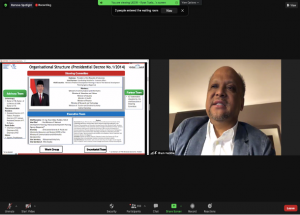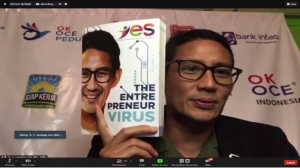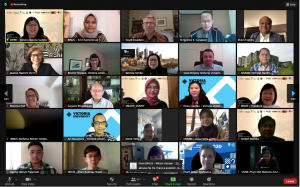International Lecture Series: A Potential Internationalization Strategy for NUNI University Members
By Satrio Nugroho, Ardian Saputra, Siti Chairunnisah
As a consortium of Indonesian universities, Nationwide University Network in Indonesia (NUNI) promotes collaboration as the way to improve the academic quality of its members and support the betterment of higher education in Indonesia, and thus in every opportunity NUNI endeavors to work together to achieve that goal.
This article attempts to provide an insight on how a recent collaboration by NUNI members arguably hold many potentials that may be applied for internationalization strategy and development of NUNI and specifically for each participating member.
NUNI International Lecture Series 2, conducted successfully from October 5th – 22nd 2020 and then followed by the Special Edition (NUNI members in collaboration with the Victorian Government) on October 26th – 30th 2020, serves as an example on how great benefits could be obtained from jointly conducting an international lecture session. In the International Lecture Series 2, five organizers (Universitas Andalas, Universitas Bina Nusantara, Universitas Islam Indonesia, Universitas Katolik Atma Jaya, and Universitas Kristen Satya Wacana) contributed 10 speakers delivering various topics related to the Covid-19 outbreak, having a total of 3,223 participants from 40 universities in Indonesia. The Special Edition of NUNI International Lecture Series 2 (initiated with the huge support from the Victorian Government in inviting 12 VIP guests of political figures, education experts, and industry leaders) gathered 3,528 participants across 69 universities in Indonesia and neighboring countries.
 This collaborative activity supports the internationalization strategy of any higher education institution, especially on the concept of Internationalization at Home. It is because the two events, delivered fully in English, exposed the participants to the new insight, knowledge, and international experience that they may not obtain in their classroom activities every day. Augmented by the recent pandemic situation where traveling is strictly regulated, this online lecture session could be a good way of implementing the internationalization strategy since online session is much more accessible, flexible, and cost-effective compared to an onsite event. Students can simply participate if they have reliable Internet connection and even speakers are able to arrange their schedule better if the event does not require them to travel to the place where they are expected to speak. This practicality is what makes online session more attractive, not only in current situation but can also be implemented in the future.
This collaborative activity supports the internationalization strategy of any higher education institution, especially on the concept of Internationalization at Home. It is because the two events, delivered fully in English, exposed the participants to the new insight, knowledge, and international experience that they may not obtain in their classroom activities every day. Augmented by the recent pandemic situation where traveling is strictly regulated, this online lecture session could be a good way of implementing the internationalization strategy since online session is much more accessible, flexible, and cost-effective compared to an onsite event. Students can simply participate if they have reliable Internet connection and even speakers are able to arrange their schedule better if the event does not require them to travel to the place where they are expected to speak. This practicality is what makes online session more attractive, not only in current situation but can also be implemented in the future.
In addition to that, organizing members will receive recognition in both national and international levels. The evidence can be seen from the participants coming from various institutions not only in Indonesia but from Japan, Taiwan, Singapore, and the Philippines. Those international students showed interest in the event and probably will spread the news to fellow students or even academics. This may lead to a better recognition by the institutions in which they are currently studying and even to open opportunities for collaboration with them or many other institutions in their networks. Running a successful joint lecture session does not benefit only in academic matter but also in the prestige and recognition of the organizing institution by others, both in national and international level, which in turn contributes to the global competitiveness of that institution.
 Another important aspect to see is how efficient resources could be allocated when jointly conducting an online session. Hosting a lecture event individually means that one institution, for example, could present one speaker in one session, enjoyed by participants from that institution only. However, when several institutions working together to create the same lecture event, the impact and benefit obtained will be greater. For example, five institutions each contributing one speaker will amount to five speakers in total, could be arranged to individually or in pairs deliver in five separate sessions, in the end bring five different insight and knowledge to participants from those five organizing institutions. The result is more profound impact to wider audience, conducted in a larger scale with the similar effort compared to when hosting it individually.
Another important aspect to see is how efficient resources could be allocated when jointly conducting an online session. Hosting a lecture event individually means that one institution, for example, could present one speaker in one session, enjoyed by participants from that institution only. However, when several institutions working together to create the same lecture event, the impact and benefit obtained will be greater. For example, five institutions each contributing one speaker will amount to five speakers in total, could be arranged to individually or in pairs deliver in five separate sessions, in the end bring five different insight and knowledge to participants from those five organizing institutions. The result is more profound impact to wider audience, conducted in a larger scale with the similar effort compared to when hosting it individually.
This online session of course provides its own challenge and limitation. Conflicting schedule or academic calendar is the first factor, referring to the fact that each institution or university has different agenda for its academic activities and thus conducting a joint event require more careful planning to be able to maximize the involvement of participants. Additionally, it should be noted that even during their available time, encouraging students to actively participate in an online session could be another challenge to the organizers. The session itself, as any online activity relies on the Internet connection and online platforms, may experience technical errors, compatibility issues and other problems which are not found on an onsite event, some of which cannot be solved by simply bringing the technicians because everyone participates from their own place. Another limitation on the online session is that it is less interactive compared to the onsite one, since speakers and participants communicate remotely using the online platform and many people admit that they cannot feel the real interaction compared to joining it onsite. This will lead to less enjoyment in participating in an online session, which is an issue that the organizers must plan in order to make it as attractive as an onsite session.

Nevertheless, online lecture session is a great alternative to conduct a collaboration among NUNI members which supports the internationalization strategy. This could be implemented in the future even after the pandemic situation is over because of the advantages elaborated above. Indeed, there is challenge and limitation of this online session, however with careful planning and smart execution any event, be it onsite or online, may be conducted successfully and wonderfully. It is recommended that this collaboration should be initiated among NUNI members, and that we believe each NUNI member will look forward to cooperating with each other for the mutual benefits and potentials it has. Let us aim to constantly improve our institution and this beloved consortium of NUNI!

Comments :